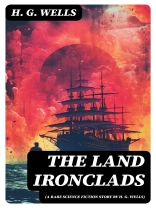In ‘The Land Ironclads, ‘ H. G. Wells explores a unique facet of military technology through a speculative lens, envisioning an alternative future where armored vehicles dominate the battlefield. Written in 1903, this short story is notable for its intricate portrayal of the ‘land ironclads’—massive armoured vehicles that challenge the very essence of war, hinting at the mechanization of conflict and the ethical dilemmas that arise from such innovations. Wells’s literary style is characterized by vivid imagery and a keen sense of irony, positioning his narrative within the burgeoning genre of science fiction that seeks not only to entertain but to provoke thought about technological advancement and its implications on society. H. G. Wells, often regarded as the father of science fiction, was profoundly influenced by the industrial advancements of his time, particularly the evolution of warfare and technology. His early exposure to social reform movements and an education steeped in science and history equipped him with a critical perspective on the trajectory of human progress. These experiences undoubtedly informed his portrayal of militarization and the potential for both innovation and destruction, themes that resonate deeply in ‘The Land Ironclads.’ For readers captivated by the interplay between technology and society, ‘The Land Ironclads’ serves as a compelling reminder of the duality of progress. As you navigate Wells’s thought-provoking narrative, you will find yourself pondering the moral implications of advancement and reflecting on the cyclical nature of human conflict. This work is essential for those who appreciate speculative fiction and its ability to provide insight into contemporary issues.
Sobre el autor
H. G. Wells, born Herbert George Wells on September 21, 1866, in Bromley, Kent, England, was a prolific writer best known for his works of science fiction. Wells’ literary career encompasses a vast range of genres, but he is famously heralded as a father of science fiction alongside contemporaries Jules Verne and Hugo Gernsback. Wells’s prescience in speculative fiction and his incisive social commentary distinguish his works. Notable titles, such as ‘The Time Machine’ (1895), ‘The War of the Worlds’ (1898), and ‘The Invisible Man’ (1897), display his penchant for exploring the implications of scientific advancements on society. In ‘The Land Ironclads, ‘ a short story first published in the Strand Magazine in 1903, Wells extrapolates the future of warfare by imagining heavy, armored vehicles that prefigured tanks before their actual use in World War I. His ability to intertwine ethical questions with futuristic scenarios has not only entertained but also influenced the direction of technological thought. Wells’s writing style is characterized by a concise, clear prose that was accessible to a wide readership, a deliberate choice to disseminate his often cautionary tales. His legacy endures in the way his speculative worlds have sparked the imagination of countless readers and have shaped the genre of science fiction. Wells passed away on August 13, 1946, but his works continue to be a touchstone in literature and the study of futurology.












